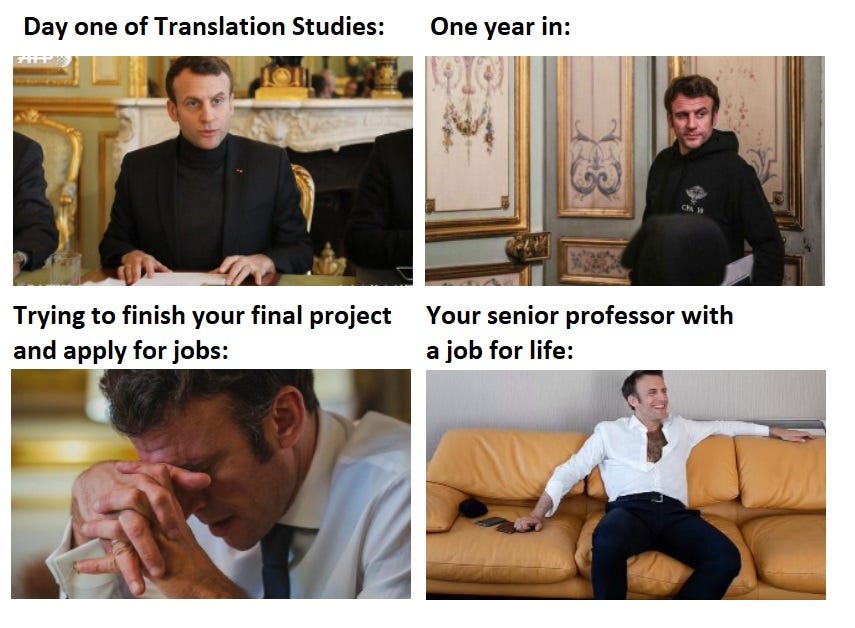Welcome, aspiring polyglot! Having fun while learning a language is great and it should be a goal for the majority of your days. However, some people take this to mean that it should never be anything but fun, and that is simply not true. Learning anything is going to be challenging, but when it comes to solo education you must impose your own challenges. Have fun, but take your language acquisition seriously. If you cannot set your own goals you will have goals set for you. Here are some ideas to get you started.
Writing essays
In school there is, believe it or not, a reason behind writing essays. Writing, at its core, is thinking. When you write you think on paper and, over time, you develop that skill to become a more masterful thinker and therefore a more competent participant in society, theoretically. The same goes for when you are learning a new language. Only, with your second language you can afford to make quite a few more mistakes so you needn’t be as strict with yourself, at least not at first.
Your fun comes in being able to choose the topic for your essay. Whether you write about a book you are reading and the implications therein both personally and societally or you choose to write a synopsis of your favorite show, what matters is that you take it seriously. Your words carry weight, you should give them the appropriate amount of consideration. Writing affords you the time to do so when speaking is more of an exercise in muscle memory.
Here are your step by steps for how to write an essay, in case you forgot:
Choose a topic
Starting out this should be primarily centered around your interests. The reason so many students turn in so much garbage is because they truly could not care less about the subject matter. While this is in part due to the educator and in part due to the educational system more broadly, it does not affect you. Meaning, you should always be choosing to do things that interest you when focusing on your solo education.
Later down the line you may have to step outside of that, but it will be more to escape your comfort zone than to force you into something you don’t want to do or something in which you have no interest. If you are just starting out, though, try to stick with what you know well in your native language. This will give you an inherent advantage when discussing the topic of choice in your target language. You will be amazed by how many overlaps there are between your native and target language in niche situations.
Create guidelines
Once you have chosen your topic it is time to decide, for yourself, what precisely constitutes a job well done. In your first weeks and months, that could be something as simple as completion. As you progress, however, these guidelines should also progress. Both in difficulty and strictness. Here are just a few things you can implement as guidelines for yourself:
Length
Fluidity
Continuity
Adherence to the topic
Grammar
Syntax
Diction
Alter these with each attempt and increase the value of each as you get better. Maybe your first essay is 100 words, but your 5th essay is 500 words. If you are writing one per week that is a 5x increase in target language output in as many weeks. That is just one consequence of taking yourself, your education, and your life seriously.
You must be reasonable, but never stop challenging yourself. For many, the most frustrating thing about public school is that it was cripplingly boring. Education doesn’t have to be like that. You control the material now, but you also control the pace. If you look up from your page and the clock says three hours have passed, remind yourself that there is no true deadline.
There is absolutely no shame in stepping away when you over did it. Sometimes a bit of rest is exactly what you need to propel you further forward. At the end of the day, your second language work isn’t going anywhere. If you ever get tired of writing essays, take a step back and try something a little more enjoyable. Alternatively, if you are looking for something more challenging, you could always try to make some videos.
Making video projects
Making a video project is the number one way to see just how well you are able to speak. It also happens to be one of the most difficult things for most people to want to do. Few people enjoy listening to themselves on recordings. Fewer still enjoy listening to recordings of them speaking a second or third language. That does not, however, mean the exercise itself is something that should be avoided. Often the things we want to do the least are the things that will help us the most.
One unique aspect of creating a video project is that you can go back and see in real time how you do things. From there you can determine if anything needs to be rectified. For the vast majority of your time speaking, you will not have this as an option. Taking videos and editing them affords you the opportunity to make corrections and gain perspectives you will not have the chance to pursue in any other aspect of language acquisition.
Whether you choose to make a short film, a topic specific YouTube style video, a video essay, a vlog, or a scripted and edited series of videos, all that matters is that you do something. As with the above, be sure to assign yourself guidelines, but with a video project there is one other thing you will need. In all likelihood you are going to need more than a couple of days to make something you feel good about having created.
For that reason alone, having deadlines set for yourself is going to be crucial. Have a deadline for each component. Dictate how much time you have to write the script, be specific about how much time you will give for editing, be generous with time estimates for how long it will take to film things. The goal is to make something you are proud of at the end of the day. So long as you are working to that end you will be heading in the right direction.
Master translations
Interpreters and translators know their target languages better than the vast majority of native speakers and there is a reason for that. The work that we do is incredibly difficult and requires an incredible amount of practice. However, the way we practice is no different than the way anyone learns a language. Ours may be more targeted, we may execute at a higher level, but at the core we do the same things as we did when we were learning at an A1 beginner level.
One way you can start working as a beginner translator, teaching yourself how to interpret the words you see and hear, is by working with dual text material. There are many books, especially the classics, that are written as “dual text”. This means that the text is in two languages side by side. Being forced to look up every other word can be frustrating and this frustration is almost entirely alleviated by having the parallel text right in front of you.
Another perfect way to get started with this today, that is perhaps more relevant to your immediate success, is translating your own thoughts. It is one thing to do it with someone else’s words, but when you are translating your own words you are learning to speak the target language in the same way you speak your native language. This is crucial in developing the requisite confidence to speak when the time comes.
For those who are looking for a little extra challenge, translating works that have not yet been translated is the ultimate test. With nothing to go off of or compare against it is up to you to find the best, most accurate, true to the meaning translations possible. This challenge will push you away from translating the definitions towards translating the meaning. Once you are speaking with meaning rather than translations, you are fluent.
Conclusion
Language apps have really skewed the idea of what language learning must necessarily look like. Yes, gamifying things is fun and it makes it easy to come back to day in and day out, but you pay with your time. As a supplement, that is fine. Something more productive than doom scrolling on social media. But your time is valuable. You only have one life. I love to have fun, especially with languages, but if you want to become fluent you must take your education seriously.
Your time is valuable and you should not spend the majority of it consuming. Exposure to your language is vital, but the ability to create with your language is far more important. Start small and define your wins. From there, start stacking until your momentum snowballs and you become unstoppable. It will be difficult, but you can do difficult things and become great. So go out and do some difficult things and become great.
Requests
If you have anything you would like covered you can reach out to me on X, Instagram, or at odin@secondlanguagestrategies.com.
Additional Resources
Don't want to spend time playing catch up? Pick up the 3 Months to Conversational book now available on Amazon! 3 Months to Conversational
For more long form content be sure to check out the website!
Subscribe for new content on YouTube and TikTok!
Learning Spanish? We have begun aggregating resources in you Spanish Resource Newsletter!
Don't forget to pick up your very own French Language Logbook or Spanish Language Logbook!









